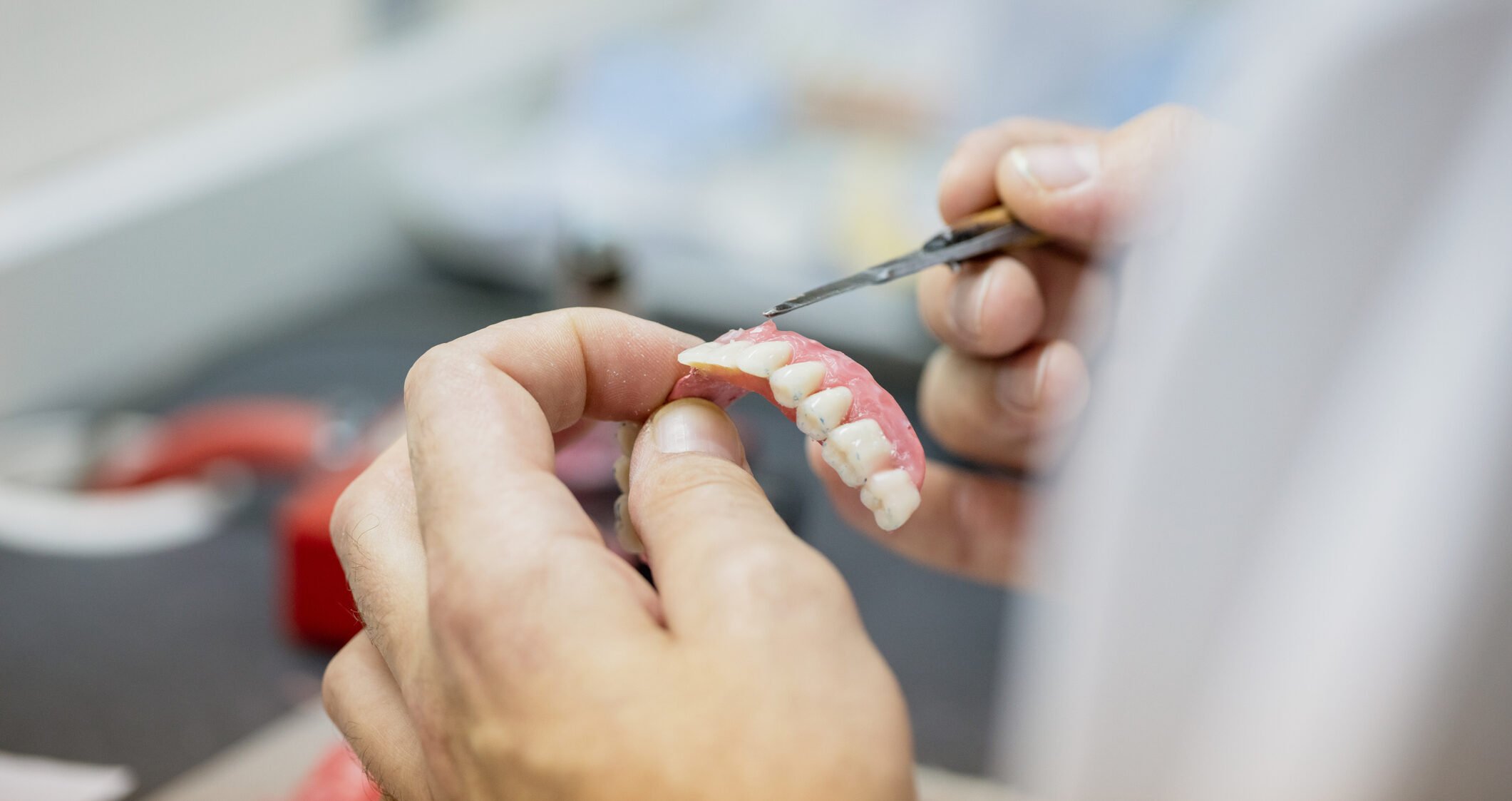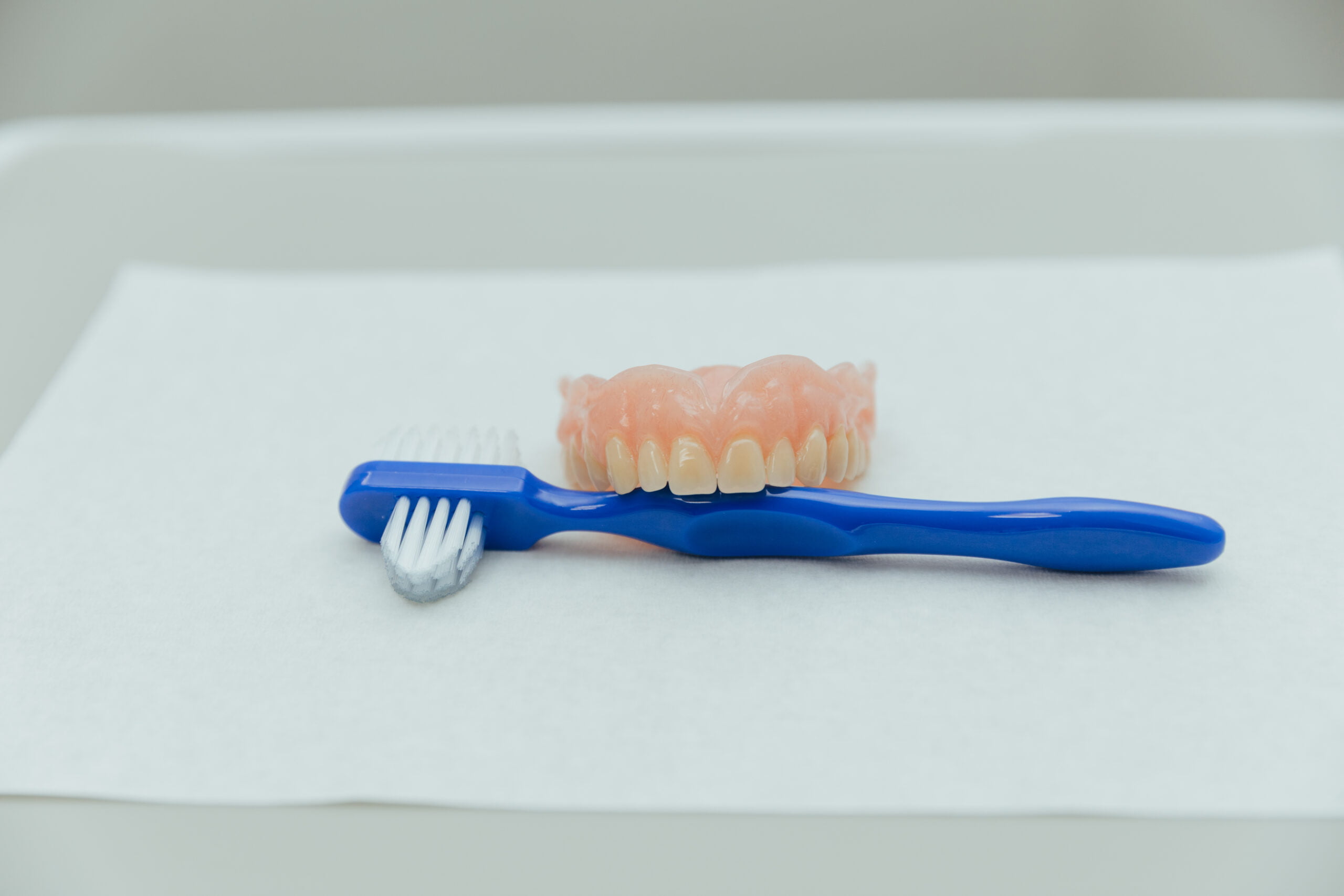Dentures
Home » Treatments » Replacing Missing Teeth » Dentures

They are usually made from acrylic, or a combination of acrylic and cobalt chrome metal. Modern materials mean that partial dentures will blend in beautifully with existing teeth and complete dentures can easily pass for the real thing.
The benefits of dentures include helping to improve how you eat and speak, as well as boosting your confidence by restoring your smile. Dentures can also enhance facial shape, plumping up the tissues especially around the lips and in the cheek area, giving your face a more youthful look.
Making a set of dentures involves quite a few stages, so it will mean you attending for a series of appointments to ensure the final set of dentures are comfortable, close fitting and stable.
Following your initial consultation, moulds or impressions will be taken of your mouth, so that plaster models of your mouth can be made in the denture laboratory. It is on these models that the various stages of the dentures are made. Each stage of the denture is tried in the mouth at the different appointments, with adjustments and measurements being made, to ensure they are entirely bespoke for you. Once a wax model of the dentures has been made and tried in your mouth to check that both you and the dentist are entirely satisfied, it is returned to the laboratory to be processed into the final set of dentures. At the ‘fit’ visit it is checked once again for fit, bite and comfort.
It can take a little while to get used to your new dentures, as they may feel odd at first. Speaking and eating can be initially tricky, so it’s a good idea to practice reading out loud at home and begin with eating softer foods then slowly introduce more challenging harder items. You may find you produce more saliva initially, but this soon improves as your mouth gets used to your replacement teeth.
We will make you a review appointment, usually after a week, to check your mouth and dentures. If you are experiencing any sore spots in your mouth, the denture surface may require some adjustment.

Dentures are hard-wearing, but they will last longer if you treat them with care. Dentures should be removed before you go to bed, to give your gums some rest, and should be stored in water to stop them drying out, which causes them to become brittle. Dogs love dentures, so don’t leave them lying around if you don’t want them chewed!
You need to clean your dentures using a special denture brush and soap, to remove food debris. If you have any remaining teeth, these are cleaned separately with a toothbrush and toothpaste. You will also need to attend regular check-ups so your dentist and hygienist can keep an eye on your oral health. For full dentures, we advise an annual checkup which includes a mouth cancer check.
Dentures wear down and will need replacing, usually after 5-10 years, even if they feel like an old comfy pair of slippers. If dentures are not replaced when worn, the face height shortens and muscle support is lost, making your face appear older. The longer you stick with one set of dentures, the harder it is to adapt to a new set. Some denture wearers like the reassurance of having a spare set of teeth, so at Cwmbran Dental Care we are happy to make you a duplicate or copy set.
Cwmbran Dental Care are pleased to be able to offer Valplast partial dentures. These are made from a flexible plastic material which is completely different to the normal acrylic material used in traditional dentures. The denture itself is flexible, and incorporates flexible clasps, which means the denture flexes and grips onto the remaining teeth and holds on to them, making the denture more secure than the rigid traditional dentures.
The clasps are made from the same material so there are no unsightly metal clasps. They are also part of the denture itself so there is no risk of them fracturing off as they sometimes do with traditional dentures.
Modern dentures are highly aesthetic, easily able to pass for natural teeth. They are more secure and comfortable than ever before, especially if supported by strong dental implants. Most people will only be able to tell you have dentures if you tell them!
The benefits of dentures include helping to improve how you eat and speak, as well as boosting your confidence by restoring your smile. Dentures can also enhance facial shape, plumping up the tissues especially around the lips and in the cheek area, giving your face a more youthful look.
Dentures can be stabilised with dental implants, which hold them securely into place. Implants are fused to your jawbone, giving the function, strength and security of natural teeth.